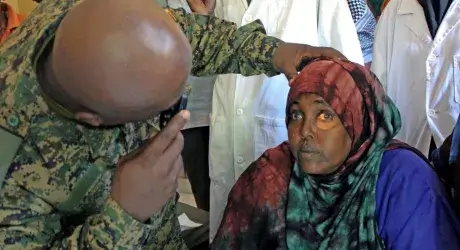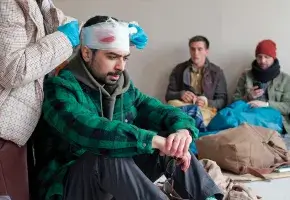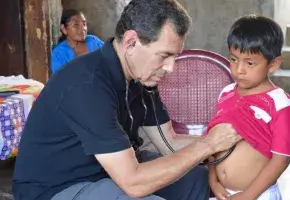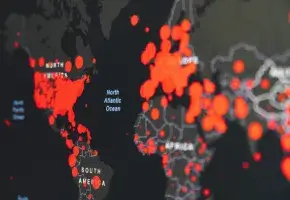Rethinking the Humanitarian Health Response to Violent Conflict

Rethinking the Humanitarian Health Response to Violent Conflict is a multiyear initiative engaging political scientists, legal and security experts, health professionals, and humanitarians to help define new strategies for the provision of essential health services in areas of violent conflict.
Delivering Humanitarian Health Services in Violent Conflicts
In response to the challenges to humanitarian health provision created by the COVID-19 pandemic, the initiative will prioritize research activities that focus directly on tackling these urgent needs. Two key issues have emerged that speak directly to the broader goals and capacities of this initiative and will therefore serve as key organizing blocks for work going forward: (1) Global Cooperation, Humanitarian Health Delivery, and Pandemic Control and (2) Migrants and COVID-19: A Humanitarian Health Crisis at the U.S.-Mexico Border.
The initiative consists of an ongoing engagement strategy involving domestic and international policy-makers, practitioners, and scholarly audiences, including international organizations and non-governmental organizations (NGOs), to help define new strategies for the effective provision of essential health services in areas of armed violence. The project includes a special focus on the creation of a transdisciplinary framework capable of integrating insights from global health sciences, international humanitarian law and humanitarian action, and political and security studies.
Primary products include publications, strategic dialogues, and other activities concerned with the humanitarian health response to violence.
The initiative consists of two major components including substantive engagement with convenings and publications. A cross-cutting Dædalus volume was issued in Spring 2023 and is available online, Delivering Humanitarian Health Services in Violent Conflicts.
The COVID-19 pandemic has both exposed and amplified the lack of cooperative mechanisms and political solidarity to address common global threats. This component of the Rethinking the Humanitarian Health Response to Violent Conflict project examines the impact of COVID-19 on great power relationships. In addition to identifying broader improvements in humanitarian health, this work specifically aims to generate concrete suggestions for how ‘islands of cooperation’ can be built among great powers in order to ensure that the pandemic does not wreak further havoc in the conflict zones where such states are either implicated or tasked with conflict resolution.
Main objectives are:
- Exploring what lessons can be learned from historical or analogous cases of efforts to address a common threat by strengthening state cooperation in situations of intense geopolitical rivalry and existential risk. See publication on International Cooperation Failures in the Face of the COVID-19 Pandemic: Learning from Past Efforts to Address Common Threats.
- Examining pandemics and UN peace operations as a targeted effort to develop recommendations on how existing missions can tailor their operations to facilitate an effective response to pandemics, building on lessons learned from past outbreaks. See publication on Peace Operations at the Intersection of Health Emergencies and Violent Conflict: Lessons from the 2018-2020 DRC Ebola Crisis.
The COVID-19 pandemic has demonstrated a stunning capacity to bypass national borders and spread across the globe. However, the international response has been to turn inward, insulate sovereign states, restrict international travel and reinforce national borders. The inherent difficulties in closing major land borders and the capacity of the pandemic to spread rapidly have underscored the need for coordinated, regional approaches to the pandemic response. This requirement for regional strategies is particularly important in areas experiencing major migrant flows fleeing political instability and organized violence.
Directed at examining the humanitarian implications of COVID-19 response amid unprecedented migration along the U.S.-Mexico border, this component of the Rethinking the Humanitarian Health Response to Violent Conflict project generated new empirical insights regarding the pandemic in border communities.
Main objectives are:
- Assessing the threat of COVID-19 on the border to understand the regional implications and current humanitarian demands. See publications on The impact of the COVID-19 pandemic among migrants in shelters in Tijuana, Baja California, Mexico and Cocirculation and replacement of SARS-CoV-2 variants in crowded settings and marginalized populations along the US-Mexico border.
- Interpreting the evidence base to develop regional humanitarian approaches to border spaces affected by pandemics and large-scale violence. See publication on Interrupted transit and common mental disorders among migrants in Tijuana, Mexico.








